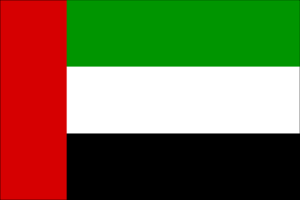United Arab Emirates: Difference between revisions
imported>Minhaj Ahmed Khan Lodi No edit summary |
imported>Minhaj Ahmed Khan Lodi mNo edit summary |
||
| Line 8: | Line 8: | ||
The economy of the UAE heavily depends on [[expatriates]]. Currently, less than 20% of UAE consists of nationals ([[Emirati]]s) with the rest being expatriates from other [[Arab]] countries, [[Iran]], [[South Asia]], and small minorities from [[South-East Asia]], [[Russia]], [[Europe]], and [[North America]]. | The economy of the UAE heavily depends on [[expatriates]]. Currently, less than 20% of UAE consists of nationals ([[Emirati]]s) with the rest being expatriates from other [[Arab]] countries, [[Iran]], [[South Asia]], and small minorities from [[South-East Asia]], [[Russia]], [[Europe]], and [[North America]]. | ||
==History== | |||
The United Arab Emirates was formed from groups of tribally organized [[Arabian Peninsula]] [[sheikhdom]]s along the southern coast of the [[Persian Gulf]] and the northwestern coast of the [[Gulf of Oman]]. The Arabs inhabiting the area were converted to [[Islam]] during the 7th century. | |||
Portions of the UAE were under [[Ottoman]] influence during the 16th century. The area was known as the [[Piracy|pirate]] coast due to constant harassing of ships from raiders based in the area. In 1920, General Treaty of peace between the [[United Kingdom|British]] Government and the Sheikhs of Ras Al Khaimah, Umm Al Quwain, Ajman, Sharjah, Dubai and Abu Dhabi was signed. The treaty was aimed at suppressing piracy along the Gulf Coast. From this, the area became to be known as the Trucial Coast. In 1892, Britain signed exclusive agreements with the Gulf States that gave Britain control over their foreign affairs and each emirate control over its internal affairs. | |||
In 1952, a Trucial Council was formed between the seven emirates to promote increased cooperation among themselves. | |||
[[Category:CZ Live]] | [[Category:CZ Live]] | ||
[[Category:Stub Articles]] | [[Category:Stub Articles]] | ||
[[Category:Needs Workgroup]] | [[Category:Needs Workgroup]] | ||
Revision as of 13:49, 2 March 2008
The United Arab Emirates is a federation of seven states (Abu Dhabi, Ajman, Dubai, Fujeirah, Ras al-Khaimah, Sharjah, and Umm al-Quwain). Prior to 1971, these Emirates were known as the Trucial states or Trucial Oman.
The UAE is a Federal constitutional monarchy, with the Emir of Abu Dhabi being the President and the Emir of Dubai being the vice president as well as Prime minister.
The capital of the UAE is Abu Dhabi and the largest city is Dubai. The official language is Arabic.
The economy of the UAE heavily depends on expatriates. Currently, less than 20% of UAE consists of nationals (Emiratis) with the rest being expatriates from other Arab countries, Iran, South Asia, and small minorities from South-East Asia, Russia, Europe, and North America.
History
The United Arab Emirates was formed from groups of tribally organized Arabian Peninsula sheikhdoms along the southern coast of the Persian Gulf and the northwestern coast of the Gulf of Oman. The Arabs inhabiting the area were converted to Islam during the 7th century.
Portions of the UAE were under Ottoman influence during the 16th century. The area was known as the pirate coast due to constant harassing of ships from raiders based in the area. In 1920, General Treaty of peace between the British Government and the Sheikhs of Ras Al Khaimah, Umm Al Quwain, Ajman, Sharjah, Dubai and Abu Dhabi was signed. The treaty was aimed at suppressing piracy along the Gulf Coast. From this, the area became to be known as the Trucial Coast. In 1892, Britain signed exclusive agreements with the Gulf States that gave Britain control over their foreign affairs and each emirate control over its internal affairs.
In 1952, a Trucial Council was formed between the seven emirates to promote increased cooperation among themselves.
